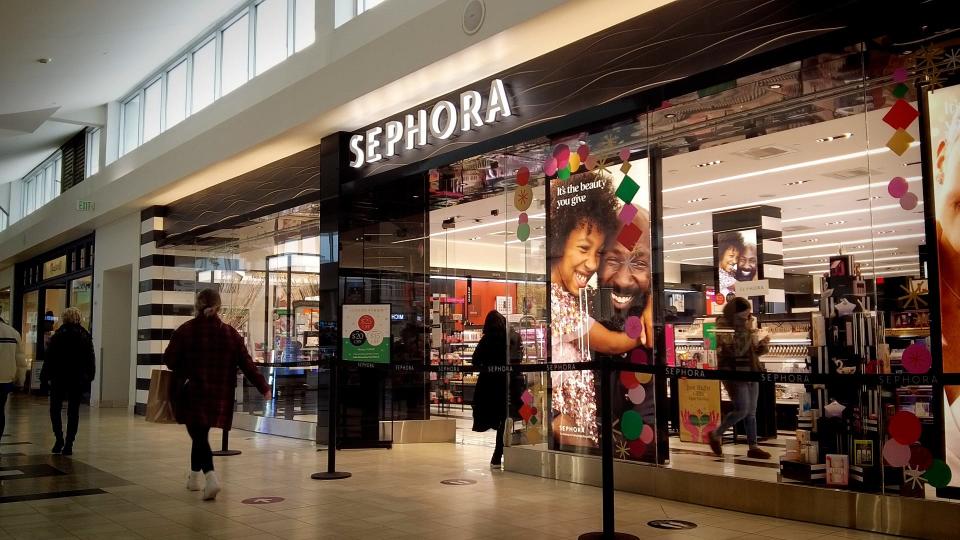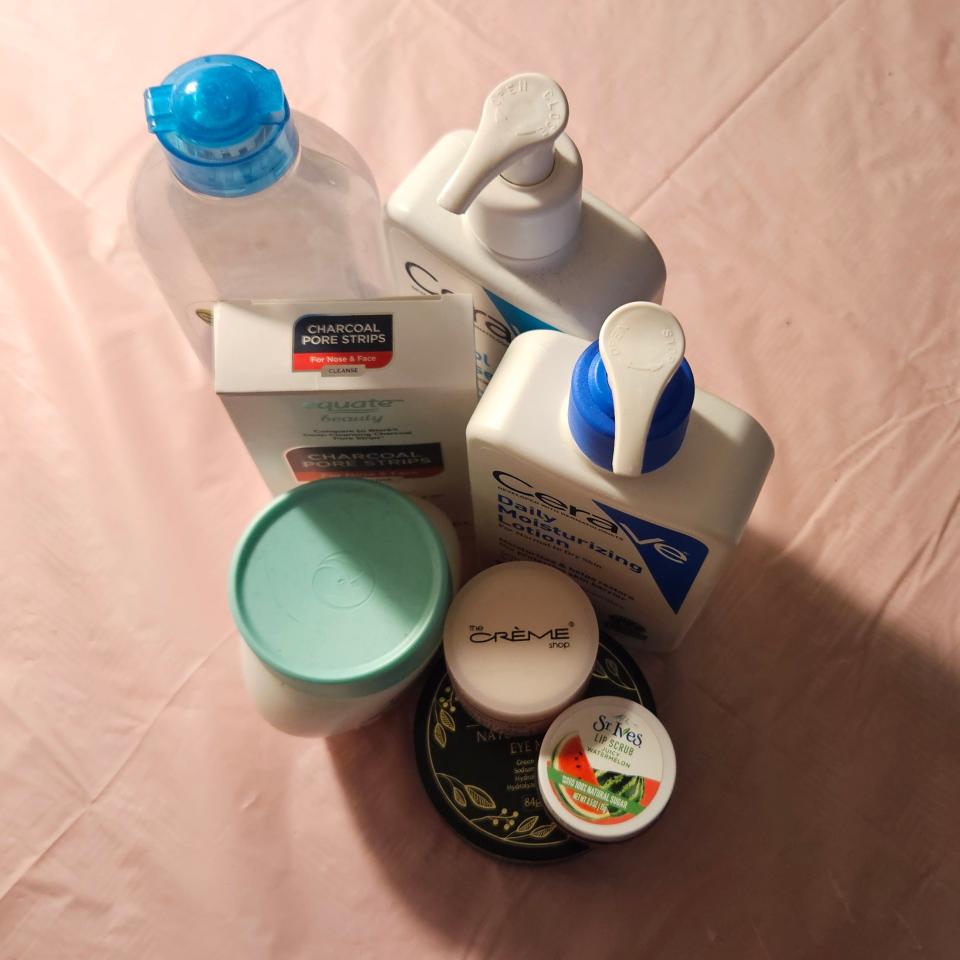'Sephora Kids' tween skincare trend concerns dermatologists, mental health professionals
It used to be cute when a child raided mommy's makeup, but the Sephora Kids trend has escalated beyond cuteness.
Sparked by social media makeup and skincare tutorials and influencer-sponsored ads, children as young as 10 have been mobbing expensive beauty stores to get their hands on the latest cosmetics.
Posts and videos tagged with the "Sephora Kids" label show tweens at the beauty shops, trying out products, and sharing their "finds" and personal skincare or makeup routines online.
Kids are even recorded trashing the stores and treating employees poorly to get the latest "gotta have" product or experimenting with the testers.
But most of these products are not geared to kids because they are made and marketed for adults and older teens. Some are specifically made for mature skin, age 40 and up.
While some parents are putting the brakes on their children's spending, others seem to give carte blanche to their kids to spend what they want where they want. The products are not cheap − the Sephora Kids target mainly high-end products with some costing upwards of hundreds of dollars
Dermatologists, mental health professionals and retailers agree − it's a fad that needs to fade.

Is the Sephora Kids trend a problem in Central Jersey?
According to Sonia Rodrigues, a psychotherapist and senior director of School and Community Based Programs at the Rutgers University Behavioral Health Care, Central Jersey has been impacted by the craze.
"We're seeing it," she said. "I think obviously, in areas that tend to be a little bit more affluent because some of these products can be very expensive. So we're certainly seeing this throughout New Jersey and other parts of the country."
The trend began to gain traction in the last 6 to 12 months. She has seen it blowing up on TikTok, but noted kids also are sharing on other social media sites, including YouTube, SnapChat and Instagram.
"Kids have become really fixated on these products," she said. "Kids do everything on FaceTime or Snapchat, and so they feel like there's this major focus on their face. And hackers and Instagrammers are really targeting anybody who will go out and buy some of these products, but I also think it's aligned with the increase of affiliate marketers and influencers."
Dr. Cindy Wassef, assistant professor of dermatology at Rutgers Robert Wood Johnson Medical School, has seen it in action in her dermatology practice.
More: Young girls are flooding Sephora in what some call an 'epidemic.' So we talked to their moms.
That curiosity can spur on a feeling of FOMO − fear of missing out − a sense that everyone seems to be doing it and you feel you need to do it too, Wassef said.
"They watch on their TikToks or their Instagrams to learn how to use products," Wassef said. "And they're really inundated with a lot of options, and I think if you see something frequently enough, you're curious."
What are mental health implications for Sephora Kids?
Pressure about appearance is not unusual, Rodrigues said.
"Kids can have a lot of anxiety about how they look," she said. "There’s a lot of identity issues happening in those preteen years, and children are absorbing content that is not necessarily age-appropriate, which makes it crucial to have these conversations with your kids about what’s appropriate for their age group while also ensuring they feel a sense of autonomy. When kids feel like they don’t fit in or cannot relate to their friend group, this can cause feelings of anxiety or depression."
If you add financial stress to the anxiety about looks, the need to fit in becomes even more acute, Rodrigues said.
"If their families don't have this money, and they're feeling all kinds of pressure like 'Everyone else around me is able to buy these products' and I can't," she said. "(Parents) want to make sure they can have these conversations with their friends about the products."
But Rodrigues believes the Sephora Kids trend is "just another one that will come and go."
"I do think that it's very much connected to kids being really worried about how they look and how they present on things like FaceTime," she said. "And I think it definitely offers distinct opportunities to engage and learn from your child about what's important to them and why it's important and offer alternatives."
What actually is it doing to their skin?
A lot of what is being bought and used by the tweens is "not necessary," Rodrigues said.
For instance, anti-aging products, such as those with retinol, are not made for children.
Age appropriate is key, Wassef said. A child at the tween age doesn't need more skin care than a gentle cleanser, moisturizer and a sunscreen.

"The main thing is at that age, you don't need much," Wassef said. "With continued use of products and starting at such an earlier age, we may see development of problems earlier in life. Also from an anti-aging perspective, the number one aging item in our world is the sun. So if you can commit just to sunscreen, that will do plenty more than any of these products can."
Social media is targeting skin issues that children do not have, such as wrinkles, loss of elasticity or other signs of aging.
But children are curious about trying new products, so the allure remains. This has risks, Wassef said.
"They could definitely get a lot of irritation to their skin, which can give them like an eczema-like dermatitis or even cause acne breakouts," she said. "This is from a lot of the products they're using are trying to prevent these issues. But using so many products that have ingredients that do the same thing or exacerbate side effects can definitely result in irritated, red, itchy skin or skin with lots of acne bumps on it. If you don't need them, you really shouldn't be using them. "
Wassef has seen children and teens with complex multi-step skincare regimens. Some already had acne, eczema, rashes or sensitive skin conditions and the excessive regimens are not helping their skin.
There are also long-term effects of using these products.
"With time, you can develop something called allergic contact dermatitis," Wassef said. "This type of allergy comes from frequent exposure. So if you're starting at a young age and using a lot of products, by nature, you will get exposed to a lot of the preservatives because they need to be there. It's not a bad thing. But increased exposure increases the chance of developing allergic contact dermatitis and eczema rashes and pimples."
Suggestions for Sephora Kids parents
Rodrigues advises parents to pay attention to what kids are buying and what they're watching on social media.
"Sit with them, and watch TikToks with them to have a sense of what the content is that they are absorbing," Rodrigues said. "Then when they want to purchase these products, ask why they are important? Have conversations about what age are these products appropriate for? I think it's important to say 'Yes, it's great that you care about your skin and having a skincare regimen − especially for some of the teenagers who are starting to have breakouts, or athletes who need to work on the excess oil and sweat − but I think it needs to be age appropriate."
Parents should not dismiss the anxieties of tweens, Rodrigues said.
"It's important to discuss what's important to them," she said. "And they're also in this stage of identity formation and trying to figure out who they are, so try to have educational conversations. Ask why? 'Why do you like this product? Where did you learn about this product? Who's using this product? Let's sit down together and look up this product and see if it's appropriate for you.' Just try to be kind of very informational and try not to shut it down right away even though sometimes we feel like 'that's crazy' and we want to shut it off.
"We want the kids to feel like we're listening to them and we're understanding why this is important to them, but also steering them towards making more appropriate decisions about their skincare."
The goal is not to shut them out but to learn what's important to them and offer alternatives.
And as for the children being allowed to roam around the stores alone, Rodrigues said many parents are not comfortable with letting their tween-aged children go to stores unaccompanied while others do not see it as a problem. There is a compromise, she said.
"I'll walk behind them," said the mother of tween sons. "So they feel like they are independent. They're walking around, but the parent is a few steps behind. Tweens are at an age where they want to be independent, and they don't want to feel like they are always with their parents. I think that that's one of the best alternatives."
email: cmakin@gannettnj.com
Cheryl Makin is an award-winning features and education reporter for MyCentralJersey.com, part of the USA Today Network. Contact: Cmakin@gannettnj.com or @CherylMakin. To get unlimited access, please subscribe or activate your digital account today.
This article originally appeared on MyCentralJersey.com: 'Sephora Kids' tween skincare trend in NJ raising concerns

